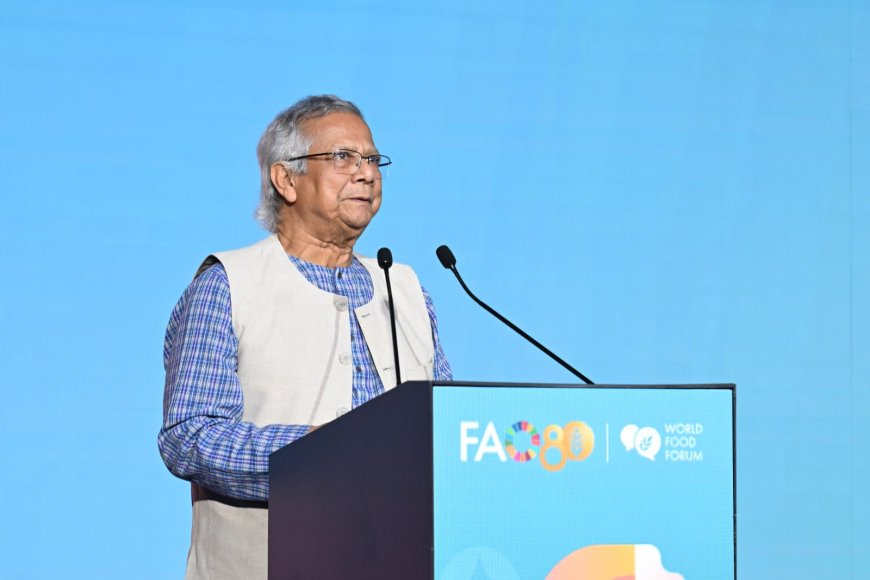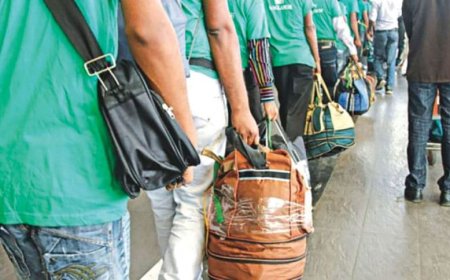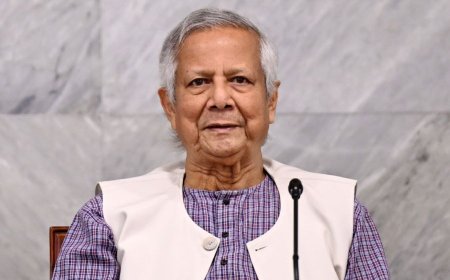CA Presents Six Proposals to End Hunger; Emphasises ‘Three-Zero World’
CA Presents Six Proposals to End Hunger; Emphasises ‘Three-Zero World’

Chief Adviser Professor Muhammad Yunus today outlined six proposals for a complete transformation of the global food and economic systems to eradicate hunger, stating that hunger stems from the failure of the existing economic framework.
“Hunger is not caused by scarcity. It is caused by the failure of the economic framework we have designed… we must change the system,” he said.
Professor Yunus made the remarks while delivering the keynote address at the grand opening of the World Food Forum (WFF) Flagship Event 2025 at the Food and Agriculture Organization (FAO) Headquarters in Rome, Italy, this afternoon (Rome Time).
Presenting six points for reforming global food and economic systems, the Chief Adviser first called for ending wars, initiating dialogue, and ensuring food access in conflict zones to break the cycle of hunger and conflict.
Secondly, he urged nations to honor their commitments — fulfill SDG financing promises, take climate action seriously, and help the most vulnerable build resilience.
Thirdly, he proposed establishing regional food banks to manage shocks and stabilize supply chains.
Fourthly, he emphasized supporting local entrepreneurs, especially young entrepreneurs, with financing, infrastructure, and global partnerships.
Fifthly, he called for ending export bans, saying trade rules must promote, not undermine, food security.
Finally, he urged ensuring access to and development of technology and innovation — particularly for the Global South and rural youth, both boys and girls.
“In 2024, 673 million people went hungry. Yet we produce more than enough food. This is not a failure of production — it’s a failure of the economic system. It’s a moral failure,” he said.
He added, “While we couldn’t raise a few billion dollars to end hunger, the world spent 2.7 trillion dollars on weapons. Is this how we define progress?”
Professor Yunus called for deeper systemic change, saying, “We must rethink the entire economic system. The old model — based on profit-maximizing business — has left billions behind.”
“We need to introduce a new kind of business — social business, business without personal profit — that solves problems instead of creating them. Many such businesses are growing around the world, but they need policy support and institutional recognition,” he noted.
Elaborating his vision of a Three-Zero World — Zero Wealth Concentration to End Poverty, Zero Unemployment, and Zero Net Carbon Emissions — he said, “This is not a dream. It is a necessity — the only way to save the world.”
Highlighting Bangladesh’s experience, he said, “We’ve seen the power of social business in Bangladesh. Grameen Bank showed how poor women can become powerful entrepreneurs. Grameen Danone fights child malnutrition. Around the world, social businesses are empowering people and communities — these are not theories, they are living examples.”
He stressed the need to create social business funds to support young entrepreneurs, women, farmers, agribusiness innovators, and technology developers. “We must build legal and financial frameworks that enable this kind of entrepreneurship — not obstruct it,” he said.
Turning to the role of youth, the Nobel laureate remarked, “Today’s young people are different — they are connected, creative, and equipped with technology that was unimaginable just 20 years ago.”
“Let’s not tell them to wait for jobs. Let’s empower them to create jobs. Let’s tell them: you are not job seekers — you are job creators,” he said, urging the creation of investment and social business funds, agri-innovation hubs, and support for agri-tech, circular food systems, and climate-smart enterprises led by youth.
“If we invest in youth, we will not only feed the world — we will change the world,” Professor Yunus asserted.
Reaffirming Bangladesh’s commitment to global cooperation, he said, “We are a founding member of the Global Alliance Against Hunger and Poverty. Together with FAO and under the G20, we are committed to real, practical support — technical, financial, and moral.”
“Now, let us work together to build a Three-Zero World,” he added.
Emphasizing imagination and innovation, he said, “The pillars of this forum — Youth, Science, Investment — are not slogans. They are the tools we need to transform our food systems and societies.”
He further said, “The world today has abundant resources and technology — with even more astonishing advancements coming every day. But we must pair these with creative ideas and sustainable business models to build a new world. If we can imagine it, we can create it.”
At the beginning of his speech, Professor Yunus reflected on FAO’s 80th anniversary, saying it was “not just a celebration but a call to prepare for the future.”
“This year’s theme, ‘Hand in Hand for Better Food and a Better Future,’ reminds us that food is not just about calories — it’s about dignity, justice, and the world we want to live in,” he said.
He also praised the FAO’s Nobel Peace Laureates Alliance for Food Security and Peace — of which he is a member — expressing hope that it will continue to set milestones in global food security.
Recalling Bangladesh’s peaceful people’s movement in 2024, led by youth to reclaim democracy, peace, and human rights, he said, “It was our youth — full of courage and hope — who led that movement. Their demand was simple: to give power back to the people and create a fair, inclusive, and trustworthy society.”
Noting that these young people are now engaged in rebuilding national institutions, the Chief Adviser said, “They are shaping a new Bangladesh — one that puts people at the center of governance. In February, we will hold our national election — institutionalizing our commitment to justice and people’s power.”
Highlighting Bangladesh’s progress in food production, he said the country feeds over 170 million people despite its limited land area and also supports 1.3 million Rohingya refugees who fled violence in Myanmar.
“We have become self-sufficient in rice, our staple crop. We are among the world’s top producers of rice, vegetables, and freshwater fish. Our farmers have raised cropping intensity to 214% and released 133 climate-resilient rice varieties,” he said.
“We’ve mechanized farming with subsidies of up to 70%, built a strong food distribution system, reduced stunting, diversified diets, and promoted green agriculture that protects soil, water, and biodiversity,” he concluded.
What's Your Reaction?





















































































